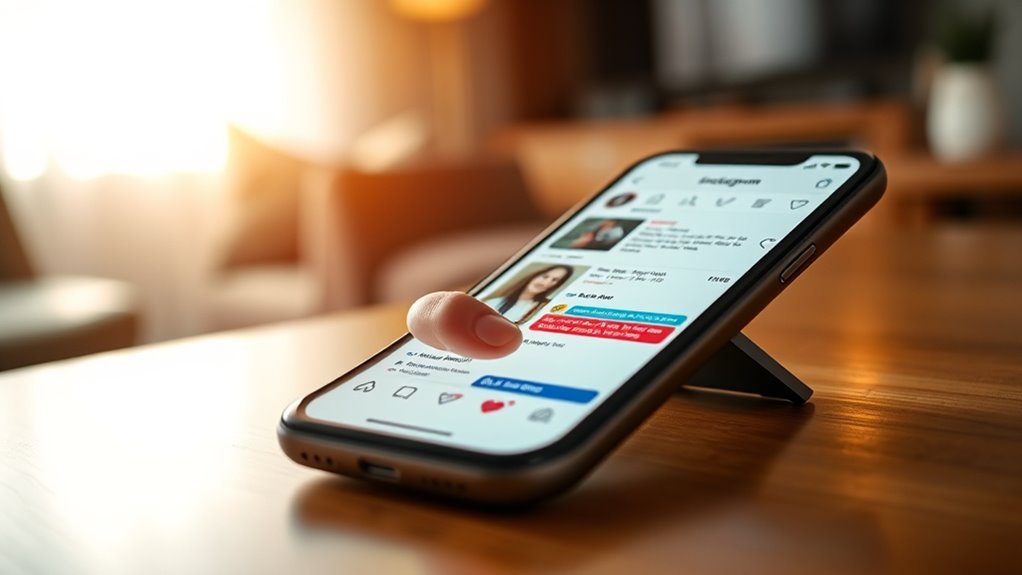Whether Instagram likes and DMs count as cheating depends on your boundaries and feelings. These digital interactions can create emotional bonds that blur personal lines and may threaten trust, especially if they feel superficial or driven by validation. If you or your partner feel uncomfortable or notice online interactions crossing boundaries, it’s a sign to address trust and expectations. Understanding how online flirting affects your relationship can help you maintain emotional integrity—there’s more to contemplate if you’re willing to explore further.
Key Takeaways
- Likes and DMs can create emotional bonds that threaten relationship trust, depending on mutual boundaries and intentions.
- Online interactions may feel superficial but can lead to emotional intimacy, blurring personal boundaries.
- Whether it’s considered cheating depends on the couple’s agreed-upon boundaries and comfort levels with digital interactions.
- Engaging in online flirtation without transparency can undermine relationship integrity and cause feelings of betrayal.
- Open communication and clear boundaries about digital behavior help prevent misunderstandings and emotional infidelity.

In today’s digital age, Instagram has become more than just a platform for sharing photos; it’s a space where flirting and emotional connections often unfold unseen. While liking a photo or sending a direct message might seem harmless, these interactions can blur emotional boundaries and lead to online temptation. You might not see it as cheating, but the line becomes fuzzy when your attention and emotional energy are diverted away from your partner. Recognizing where your boundaries lie is vital, especially in a world where digital interactions can feel intimate, even if they’re superficial on the surface.
Instagram blurs boundaries, turning simple interactions into online temptations that can threaten your relationship.
The key issue revolves around emotional boundaries. When you start engaging with others on Instagram—whether through likes, comments, or DMs—you risk crossing into territory that might threaten the trust in your relationship. These actions can foster an emotional connection that, over time, may feel more meaningful than intended. If you’re constantly seeking validation or connection from someone outside your relationship, you’re essentially opening a door to online temptation. That temptation might seem insignificant at first, but it can grow into something more substantial, making it harder to draw the line between harmless interaction and emotional infidelity.
You need to ask yourself whether your online interactions align with the boundaries you and your partner have set. Are you comfortable with your partner liking photos or chatting with someone else? If not, it’s worth examining why. Sometimes, it’s not about the act itself but about the feelings and intentions behind it. If you find yourself craving attention or emotional engagement outside your relationship, it’s a sign to reassess your boundaries and communicate openly. Maintaining transparency can help prevent misunderstandings and preserve trust.
Moreover, consider the emotional impact these interactions have on you. Are you engaging because you’re bored, seeking validation, or genuinely developing a connection? Each reason affects the emotional boundaries differently. When you allow yourself to be tempted by online interactions, you risk devaluing your relationship’s emotional integrity. Even seemingly innocent likes or DMs can set a pattern that’s hard to break, especially when they start to feel more rewarding than real-life interactions with your partner. Additionally, understanding how high refresh rates improve visual experiences can remind us of the importance of clarity and precision in maintaining healthy boundaries.
Ultimately, you have control over how you navigate Instagram. Being mindful about your online behavior and aware of where your emotional boundaries lie can help you avoid crossing lines that might jeopardize your relationship. Recognize that online temptation is real, and it’s up to you to decide what’s acceptable and what isn’t. Clear boundaries, open communication, and honest self-awareness are your best tools for ensuring that your digital interactions don’t become sources of regret or betrayal.
Frequently Asked Questions
Can Liking a Photo Be Seen as Emotional Infidelity?
Liking a photo can be seen as emotional infidelity if it crosses your partner’s virtual boundaries. If your actions make your partner uncomfortable or breach emotional boundaries, it may be considered cheating. You should communicate openly about what’s acceptable online. Respecting these boundaries helps maintain trust and prevents misunderstandings, ensuring both of you feel secure in your relationship. Always consider how your online interactions impact your partner’s feelings.
Is It Cheating if I Message Someone Privately on Instagram?
Messaging someone privately on Instagram can cross your partner’s online boundaries if it sparks intimacy or secrecy. Think of digital boundaries as a fence protecting your relationship; when you step over it, trust can be damaged. If your intent is innocent, be transparent about your messages. Otherwise, it might be viewed as emotional cheating. Always communicate openly to keep your connection strong and respect each other’s digital boundaries.
How Many Likes or DMS Cross the Line Into Cheating?
You cross the line into cheating when your likes or DMs breach your emotional boundaries or feed online temptation, causing emotional or physical intimacy that your partner wouldn’t approve of. It’s not about a specific number but about how your online interactions affect your relationship. If your digital flirting sparks feelings or secrets, it’s time to reevaluate. Stay honest, respect boundaries, and communicate openly to avoid crossing into cheating territory.
Does the Intent Behind a DM Matter in Defining Cheating?
Yes, intent behind a DM matters more than the action itself. If your goal is emotional connecting, it can feel just as impactful as physical cheating, even if the action seems innocent. You’re responsible for understanding whether your intent aligns with your partner’s boundaries. Clear communication helps you navigate these gray areas, ensuring that your digital interactions stay respectful and avoid crossing emotional lines that could damage trust.
Are There Different Rules for Social Media Flirting in Relationships?
Yes, social media flirting often has different rules in relationships. While digital boundaries vary, many couples agree that liking photos or sending DMs crosses into flirting territory, blurring social media norms. You should discuss boundaries openly, as what’s acceptable for one person might be a breach for another. Recognizing these differences helps prevent misunderstandings and keeps your relationship respectful, even when steering through the complex world of online interactions.
Conclusion
Ultimately, whether Instagram likes and DMs count as cheating depends on your relationship boundaries. Imagine your partner consistently liking and messaging an ex, blurring lines of intimacy. If it makes you uncomfortable, it’s worth discussing openly. Clear communication helps you both understand what’s acceptable. Remember, digital flirting can feel harmless but can also cause real hurt. Trust your instincts and set boundaries to guarantee your relationship stays respectful and secure.









